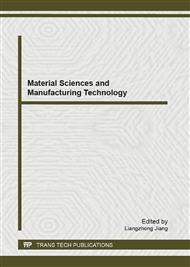[1]
Agrawal R, Imielinski T, Swami A. Mining association rules between sets of items in large databases. Proceedings of the 1993 ACM SIGMOD Conference, Washington DC. 1993; 207-16.
DOI: 10.1145/170036.170072
Google Scholar
[2]
Gao J, Gen M, Sun L, Zhao X. A hybrid of genetic algorithm and bottleneck shifting for multiobjective flexible job shop scheduling problems. Computers and Industrial Engineering 2007; 53: 149-62.
DOI: 10.1016/j.cie.2007.04.010
Google Scholar
[3]
Gao J, He G, Wang Y. A new parallel genetic algorithm for solving multiobjective scheduling problems subjected to special process constraint. International Journal of Advanced Manufacturing Technology 2009; 43: 151-60.
DOI: 10.1007/s00170-008-1683-2
Google Scholar
[4]
Gu J, Gu M, Cao C, Gu X. A novel competitive co-evolutionary quantum genetic algorithm for stochastic job shop scheduling problem. Computers and Operations Research 2010; 37: 927-37.
DOI: 10.1016/j.cor.2009.07.002
Google Scholar
[5]
Hartmann S. A self-adapting genetic algorithm for project scheduling under resource constraints. Naval Research Logistics 2002; 49: 433-48.
DOI: 10.1002/nav.10029
Google Scholar
[6]
Wang L, Zheng DZ. A modified genetic algorithm for job shop scheduling. International Journal of Advanced Manufacturing Technology 2002; 20: 72-6.
DOI: 10.1007/s001700200126
Google Scholar
[7]
Shao X, Li X, Gao L, Zhang C. Integration of process planning and scheduling-A modified genetic algorithm-based approach. Computers and Operations Research 2009; 36: 2082-96.
DOI: 10.1016/j.cor.2008.07.006
Google Scholar
[8]
Khademi Zare H, Fakhrzad MB. Solving flexible flow-shop problem with a hybrid genetic algorithm and data mining: A fuzzy approach. Expert Systems with Applications 2011; 38: 7609-15.
DOI: 10.1016/j.eswa.2010.12.101
Google Scholar
[9]
Sha DY, Liu CH. Using data mining for due date assignment in a dynamic job shop environment. International Journal of Advanced Manufacturing Technology 2005; 25: 1164-74.
DOI: 10.1007/s00170-003-1937-y
Google Scholar
[10]
Zhang X-Z, Xing L-N, Wu X. Data mining algorithm based on genetic algorithm and its application. Harbin Gongcheng Daxue Xuebao/Journal of Harbin Engineering University 2006; 27: 384-8.
Google Scholar
[11]
Yan C. Research on the Key Techniques of Real-time Data Acquisition and Scheduling in Manufacturing Execution System Based on Data Mining. 2006; 81-96.
Google Scholar
[12]
Zhang M-C, Yan C-L, Zhu K-Y. A new hybrid algorithm for association rule mining. Journal of Donghua University (English Edition) 2007; 24: 598-603.
Google Scholar
[13]
Wang L. Shop Scheduling with Genetic Algorithm. Beijing: Tsinghua University Press; (2003).
Google Scholar
[14]
H. Fisher GLT. Probabilistic learning combinations of local job-shop scheduling rules. Englewood Cliffs, New Jersy: Prentice-Hall; (1963).
Google Scholar


